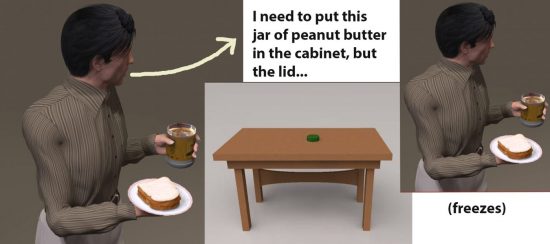A New Look at Freezing: ‘Scenario Looping Breakdowns’ As an Early Symptom
Written by |

Reframing how we describe symptoms of Parkinson’s disease (PD) can help us understand the disease spectrum concept that I introduced last week. One such symptom is the movement disorder called “freezing.” I believe there is an early PD symptom variation of freezing, called “scenario looping breakdown.” Understanding it may help people realize what drives this symptom.
When I first heard the term freezing, I pictured a deer frozen in the headlights of a car. It wasn’t until I started experiencing subtle variations of inability to move a given muscle (it was frozen) that I understood freezing connected to something I lectured on when I worked with people who had neurological impairments. At that time, I called it, “scenario looping.”
Scenario looping is best described with a story: Imagine you’re at the grocery store to pick up dinner supplies. It’s early afternoon (no pressure) and while strolling aisles, your eyes wander about, checking people out. You see somebody vaguely familiar. The person turns to face you and your heart skips. It’s that gorgeous person you have a passionate crush on, walking to you with a big smile. Your face as red as the beets in the produce section, you smile and engage in pleasantries. The conversation turns to, “Well, what are you doing after you’re done shopping?” Every fiber in your body screams at you, “I want to spend intimate time with this person right now!” At the same time, you have in your hand a small shopping basket with spaghetti sauce, specialty meatballs, and gluten-free noodles. What do you do?
Arriving at the answer involves “looping” through the scenario over and over, weighing the consequences of any action until you arrive at a satisfactory answer of what to do. Scenarios of all types are presented to us every day. We constantly face decisions about how to use our time, how to structure our language, and even how to structure our internal dialogue. All of this connects to scenario looping.
Scenario looping also connects to motor sequencing. If you wanted to leave the spaghetti behind and immediately walk out with your old flame, then you would need to tell your body to do the necessary motor sequences. We may not think of motor sequences as part of how we interact with the day because so much of our movement, like walking, is nearly automatic.
The term “freezing” associated with PD commonly refers to freezing while walking. Walking is often automatic. We have done so much walking in our lives that it has become a motor sequence we don’t think of — an overlearned motor scenario loop. We don’t have to think about every step we take. We can run on autopilot. Think of autopilot as a small string of actions that almost automatically function in the background of your mind. If autopilot functions properly, you can simultaneously walk and have a conversation or listen to music. As the saying goes, “You can walk and chew gum at the same time.”
The Parkinson’s Disease News Today forums are a place to connect with other patients, share tips and talk about the latest research. Check them out today!
It is possible that scenario looping breakdowns are symptoms indicating PD’s presence. Patients often hesitate — the “breakdown” — before motor engagement. Here is an example: I finish making a PB&J sandwich and I put the jam away. I have the sandwich on a plate in my left hand. The jar of peanut butter is in my right hand, but the top to the jar sits on the counter. I want to put the peanut butter away, but for a moment I freeze, staring at the lid of the peanut butter jar on the counter. The motor steps should happen, almost without thought: Put down the plate, grab the lid, screw it on, and put the peanut butter away. I should engage in motor sequencing by scenario looping through the choices that must be made to complete the task and arrive at the desired outcome. But it doesn’t happen — there is a hesitation, a momentary freeze — a scenario looping breakdown.
The scenario looping breakdown should help the person with PD to understand more clearly what happens to their brain when they are freezing.
***
Note: Parkinson’s News Today is strictly a news and information website about the disease. It does not provide medical advice, diagnosis or treatment. This content is not intended to be a substitute for professional medical advice, diagnosis, or treatment. Always seek the advice of your physician or another qualified health provider with any questions you may have regarding a medical condition. Never disregard professional medical advice or delay in seeking it because of something you have read on this website. The opinions expressed in this column are not those of Parkinson’s News Today or its parent company, Bionews Services, and are intended to spark discussion about issues pertaining to Parkinson’s disease.







Cassie
FOR GROUP